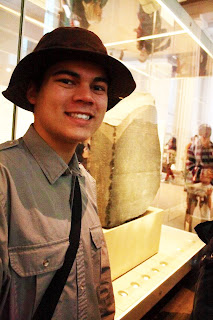This is a piece that I wrote a long time ago and posted on Facebook. If you saw it there, consider this a second edition: slightly different, expanded, edited for clarity, etc.
I have a friend/acquaintance who,
for some reason, is not down with capitalism.
She takes as many opportunities as she can to bash it or in some way
make it seem bad. She even once called a
particular inefficiency in the student government “pure capitalism”. As an economist, it makes me sad to hear such
misdirected remarks. If I were to
respond to her, and to people in general who don’t like capitalism (like Michael
Moore, the man who made the documentary “Capitalism: A Love Story”), I might
say something like this.
Why bite the hand that feeds
you? Don’t you know that your standard
of living is a gift of the free market?
The very core of capitalism is free people who do what they want that
end up making everyone else better off.
Answer me this: why did Steve Jobs start Apple? Why did he invent the iPod? He wanted to make money. That greedy SOB had the audacity to want to
gain wealth for himself (something that is highly frowned upon by the more
noble communist and socialist economic systems).
Question: was he enriched immensely as a result of all of his inventing? Absolutely.
Who was even more enriched?
Everyone else. Steve Jobs and
Apple, though not the only mp3 manufacturer in the world, almost singlehandedly
gave people a way to listen to music on the go.
Only a few decades ago, people had to be near a large record player or
in a concert to hear music, but now everyone has immediate access to all their
music regardless of where they are because of innovators like Jobs and others
like him. I would also like to point out
that this innovation leads to ever increasing standards-of-living such as the
world has never seen before. Realize
that John Rockefeller, possibly the richest man ever, didn’t even have the
option to carry his music around like any common person can do today. That’s a phenomenon of capitalism. Matt Ridley points out in his excellent book, The Rational Optimist, that luxuries like refrigeration, electric lighting, televisions, and others that even the poorest people in America have access to are luxuries that Cornelius Vanderbilt and the other richest men in history didn't have.
Let’s move on to another way that
the free market makes us better off.
Consider fruit for an example.
Where does it come from? For me it comes from the cafeteria but
originally it comes from orchards, vineyards, etc from all over the world. It came to within walking distance of where I
live by a lot of people who coordinated with each other to pick it from the
trees, load it into trucks and boats, sell it to the grocery stores, and be
bought by Gordon College before finally being brought to the cafeteria ready to
be purchased by me. By the way, and this
is a really big deal, notice that I have a choice of several fruits year
round. There’s another trick called
refrigeration. When in history have
people ever had continuous access to non-seasonal fruit besides this modern
age? The true miracle here is that all
of this was done without government coercion.
People simply did it because they wanted to make money. So I end with the “pure capitalism” that my
friend missed; this is a quote from Adam Smith’s The Invisible Hand, “It
is not from the benevolence of the butcher, the brewer or the baker, that we
expect our dinner, but from their regard to their own self interest.” This is a heavy subject and perhaps the topic of another essay, but for now I highly recommend considering the spontaneous coordination of millions of individuals in "I, Pencil." This is quite possibly the biggest miracle of the modern world.



0 comments:
Post a Comment